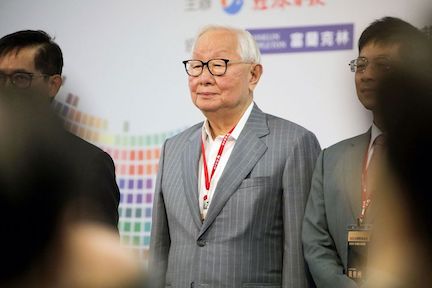TSMC founder says breaking up chip supply chain will be costly
Taiwan Semiconductor Manufacturing Co. founder Morris Chang warned that efforts by governments around the world to build domestic chip supply chains could push up costs and yet still fail to achieve self-sufficiency.
Speaking as Taiwan’s envoy to the Asia-Pacific Economic Cooperation leaders’ virtual meeting, Chang’s comments come as Taiwan’s dominant position in the semiconductor business has come under pressure, amid a widespread global chip shortage and calls in Tokyo to Washington and Beijing for domestic chipmakers to increase self-reliance.
“Free trade over the past few decades has significantly boosted the development of semiconductor technology,” Chang told reporters Friday night in Taipei. “More complex technology has led to the supply chain going offshore,” he said. “If we try to turn back the time, costs will go up, technology development will slow down.”

While not naming any specific country, Chang said governments may still not be able to build a self-sufficient supply chain after spending hundreds of billions of dollars and many years on it.
The administration of U.S. President Joe Biden is proposing a $52 billion bill to boost chip production and bolster semiconductor research and development on U.S. soil, and the European Union plans to double chip production to at least 20% of world supply by 2030. Chinese President Xi Jinping has appointed his economic czar Liu He to oversee the country’s efforts to reduce reliance on TSMC and other foreign chip companies.
Chang continued to champion the foundry business model he pioneered, which has led to global chip production to be highly concentrated in Taiwan, particularly for cutting-edge semiconductors that are used in smarpthones and servers. But TSMC is now gradually departing from that path with various overseas projects. The company is building a $12 billion factory in Arizona, planning expansion in the eastern Chinese city of Nanjing, and mulling over a specialty technology plant in Japan.
Still, Chang said the old way is still the best for fulfilling global consumer demand.
“It is prudent to have a domestic, self-sufficient chip supply chain for some national-security applications. However, for the massive demand in the private sector, it is best to maintain a chip supply chain based on the free-trade system,” he said.
Similar Stories

December 2024 U.S. Transportation Sector Unemployment (4.3%) Was the Same As the December 2023 Level (4.3%) And Above the Pre-Pandemic December 2019 Level (2.8%)
View ArticleDP World appoints Jason Haith as Vice President of Freight Forwarding for U.S. and Mexico
DP World, a global leader in logistics and supply chain solutions, has announced the appointment of Jason Haith as Vice President, Commercial Freight Forwarding – U.S. and Mexico, effective immediately.…
View Article
Amaero secures final approval for $23.5M loan from Export-Import Bank
View ArticleU.S. Bureau of Labor Statistics employment situation
Total nonfarm payroll employment increased by 256,000 in December, and the unemployment rate changed little at 4.1 percent, the U.S. Bureau of Labor Statistics reported today. Employment trended up in…
View ArticleImport Cargo to remain elevated in January
A potential strike at East Coast and Gulf Coast ports has been avoided with the announcement of a tentative labor agreement, but the nation’s major container ports have already seen…
View ArticleS&P Global: 2025 U.S. transportation infrastructure sector should see generally steady demand and growth
S&P Global Ratings today said it expects activity in the U.S. transportation sector will continue to normalize in 2025, with growth rates for most modes of transportation slowing to levels…
View ArticleGet the most up-to-date trending news!
SubscribeIndustry updates and weekly newsletter direct to your inbox!





